外研社浙大新编大学英语第二版第五册上机自学测试题第九单元答案
新编大学英语5(浙大)课后习题答案(打印版)
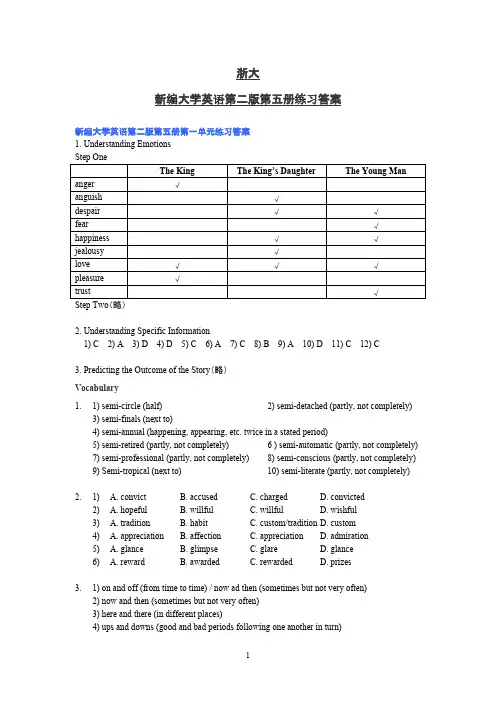
新编大学英语第二版第五册第二单元练习答案 Post-Reading 1. Understanding the Organization of the Text 1) Introduction: (Para.1) A homeless man expresses thanks to a man holding the door for him Setting: a local restaurant Characters: shoppers, families and students Situation: the coming and leaving of a homeless man 2) Main Body (Para.2-11) There’s a lack of good manners in today’s world. Supporting evidence: AAt the restaurant, no one thanked the people providing the service; (Para.2) BWomen hardly show their gratefulness to people for their help while driving; (Para.4) CFewer men hold open doors for those behind them; (Para.4) DVery often parents do not apologize for what their children do; (Para.7) EChildren are not schooled in social graces; (Para.8) FRude language is so commonplace that it is accepted behavior. (Para.10) 3) Conclusion (Para.12-13) The importance of manners: In a crowded world, being polite to each other helps ease our daily stress.
新编大学英语5答案
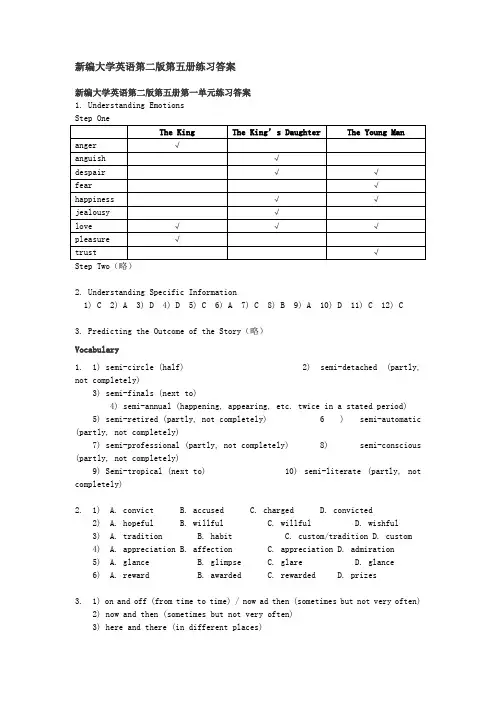
新编大学英语第二版第五册练习答案新编大学英语第二版第五册第一单元练习答案1. Understanding EmotionsStep Two(略)2. Understanding Specific Information1) C 2) A 3) D 4) D 5) C 6) A 7) C 8) B 9) A 10) D 11) C 12) C3. Predicting the Outcome of the Story(略)Vocabulary1. 1) semi-circle (half) 2) semi-detached (partly, not completely)3) semi-finals (next to)4) semi-annual (happening, appearing, etc. twice in a stated period)5) semi-retired (partly, not completely) 6 ) semi-automatic (partly, not completely)7) semi-professional (partly, not completely) 8) semi-conscious (partly, not completely)9) Semi-tropical (next to) 10) semi-literate (partly, not completely)2. 1) A. convict B. accused C. charged D. convicted2) A. hopeful B. willful C. willful D. wishful3) A. tradition B. habit C. custom/tradition D. custom4) A. appreciation B. affection C. appreciation D. admiration5) A. glance B. glimpse C. glare D. glance6) A. reward B. awarded C. rewarded D. prizes3. 1) on and off (from time to time) / now ad then (sometimes but not very often)2) now and then (sometimes but not very often)3) here and there (in different places)4) ups and downs (good and bad periods following one another in turn)5) far and near (everywhere) 6) now ad then (sometimes but not very often)7) up and down (moving upwards and downwards)8) day and night (all the time) 9) day and night (all the time)10) on and off (from time to time)Part Three Further Development1. Enriching Your Word Power1) B 2) B 3) A 4) B 5) B 6) A 7) A 8) B 9) A 10) C2. Can You Solve ThisAnswer: The murderer is Mrs. Van Pelt.Reasons: 1) Mrs. Van Pelt smoked;2) Mrs. Van Pelt was wearing blue;3) A note found in Mrs. Van Pelt’s purse (She Knew about her husband’s affair with a lady called Elizabeth);4) At 11:10, five minutes after the murder, Mrs. Van Pelt came into the kitchen and heated milk.5) Mrs. Van Pelt’s name was Jane (Her husband was in love with someone else and wanted to divorce her).新编大学英语第二版第五册第二单元练习答案Post-Reading1.Understanding the Organization of the Text1) Introduction:A homeless man expresses thanks to a man holding the door for himSetting: a local restaurantCharacters: shoppers, families and studentsSituation: the coming and leaving of a homeless man2) Main BodyThere’s a lack of good manners in today’s world.Supporting evidence:A At the restaurant, no one thanked the people providing the service;B Women hardly show their gratefulness to people for their help while driving;C Fewer men hold open doors for those behind them;D Very often parents do not apologize for what their children do;E Children are not schooled in social graces;F Rude language is so commonplace that it is accepted behavior.3) ConclusionThe importance of manners:In a crowded world, being polite to each other helps ease our daily stress.2.Understanding Specific Information1) B 2) B 3) C 4) A 5) C 6) C 7) B 8) B3.Expressing Your Own Ideas1)At the end of the article, the author raises the question, “Are we reallyso pressured that we cannot stop to observe simple co urtesy” What do you think her answer would be Do you agree with her How do you explain the lack of courtesySAMPLE:The author’s answer must be “No”. I agree with her entirely. I think the lack of good manners is due to the following reasons:— People have n’t realized the importance of good manners;— There is a general lack of good manners in the society;— Children are not taught to observe courtesy at home and at school.2) The author says that “In a crowded world, manners are of vital importance.” Do you agree If so, whySAMPLE:I agree with what the author says in the article. With the increase of population, the world seems smaller. This inevitably causes more inconveniences, troubles, etc. If people do not observe courtesy in their everyday life, there will be quarrels, conflicts and even fights. The whole society will be in chaos. So I think that manners are really of vital importance in the world today.Vocabulary1. home-style (l. 1): like what is made at homeshopper (l. 2): someone who buys things in shopshomeless (l. 4): without a homediner (l. 12): someone who is eating dinner in a restaurantdiscomfort (l. 13): the state of being uneasy/uncomfortabletakeout (l. 14): dissatisfaction, disapprovaldisapproving (l. 21): showing that you think someone or something is bad or undesirableinconsiderate (l. 63): not caring about the feelings, needs or comfort of other peopledispleasure (l. 65): dissatisfaction; disapprovaloversensitive (l. 66): too easily influenced or offendeddisintegration : the state of becoming weaker or less united and being gradually destroyedbreakdown (l. 73): collapse (n.); failure to progress2. Fill in the blanksDirections: Fill in the blanks with the words and phrases given below. Change the form if necessary.commit gather up acknowledge help out inhabit be destined to indication chasederive from observe1)After he received the phone call, John gathered up his papers and left theroom.【译文】接了一个电话之后,约翰收起他的论文离开了房间。
新编大学英语第五册-课文翻译及答案(浙江大学)
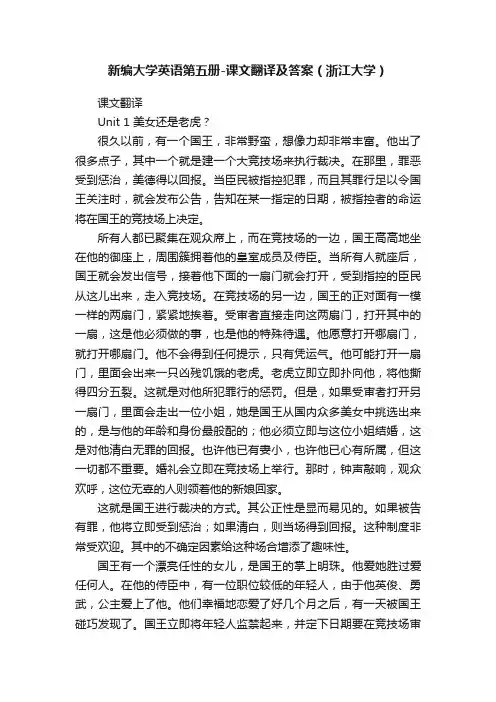
新编大学英语第五册-课文翻译及答案(浙江大学)课文翻译Unit 1 美女还是老虎?很久以前,有一个国王,非常野蛮,想像力却非常丰富。
他出了很多点子,其中一个就是建一个大竞技场来执行裁决。
在那里,罪恶受到惩治,美德得以回报。
当臣民被指控犯罪,而且其罪行足以令国王关注时,就会发布公告,告知在某一指定的日期,被指控者的命运将在国王的竞技场上决定。
所有人都已聚集在观众席上,而在竞技场的一边,国王高高地坐在他的御座上,周围簇拥着他的皇室成员及侍臣。
当所有人就座后,国王就会发出信号,接着他下面的一扇门就会打开,受到指控的臣民从这儿出来,走入竞技场。
在竞技场的另一边,国王的正对面有一模一样的两扇门,紧紧地挨着。
受审者直接走向这两扇门,打开其中的一扇,这是他必须做的事,也是他的特殊待遇。
他愿意打开哪扇门,就打开哪扇门。
他不会得到任何提示,只有凭运气。
他可能打开一扇门,里面会出来一只凶残饥饿的老虎。
老虎立即立即扑向他,将他撕得四分五裂。
这就是对他所犯罪行的惩罚。
但是,如果受审者打开另一扇门,里面会走出一位小姐,她是国王从国内众多美女中挑选出来的,是与他的年龄和身份最般配的;他必须立即与这位小姐结婚,这是对他清白无罪的回报。
也许他已有妻小,也许他已心有所属,但这一切都不重要。
婚礼会立即在竞技场上举行。
那时,钟声敲响,观众欢呼,这位无辜的人则领着他的新娘回家。
这就是国王进行裁决的方式。
其公正性是显而易见的。
如果被告有罪,他将立即受到惩治;如果清白,则当场得到回报。
这种制度非常受欢迎。
其中的不确定因素给这种场合增添了趣味性。
国王有一个漂亮任性的女儿,是国王的掌上明珠。
他爱她胜过爱任何人。
在他的侍臣中,有一位职位较低的年轻人,由于他英俊、勇武,公主爱上了他。
他们幸福地恋爱了好几个月之后,有一天被国王碰巧发现了。
国王立即将年轻人监禁起来,并定下日期要在竞技场审判他。
这样的案子以前从未发生过;以前也从未有任何臣民胆敢爱上国王的女儿。
外研社浙大新编大学英语第二版第五册上机自学测试题第五单元答案

3. 1) B 2) A 3) C 4) C 5) A
6) B 7) A 8) C 9) B 10) A
4.Choose an appropriate word to complete the following sentences
【译文】如果你能小心翼翼地、有限制地使用这种方法,你总能得到同样的结果。
6) Our capacity for giving care, love and attention is limited.
【译文】我们给予关心、爱和注意的能力是有限的。
7) The president says he is optimistic that an agreement can be worked out soon.
【译文】 该书描述了一个一心一意追求卓越的年轻人。
3) Paul had been wondering what research he should undertake in order to get his doctorate (博士学位).
【译文】 保罗在想为了拿到博士学位,他应当做哪方面的研究。
restraint preserve undertake illusion exceed intimate indulge pursuit capacity deprive ground (v.) optimistic
1) I discussed with my intimate friends whether I would further my studies after graduation.
【译文】她长得很快,衣服总是小。所以她妈妈就总得给她买新衣服。
新编大学英语5(浙大)课后习题答案
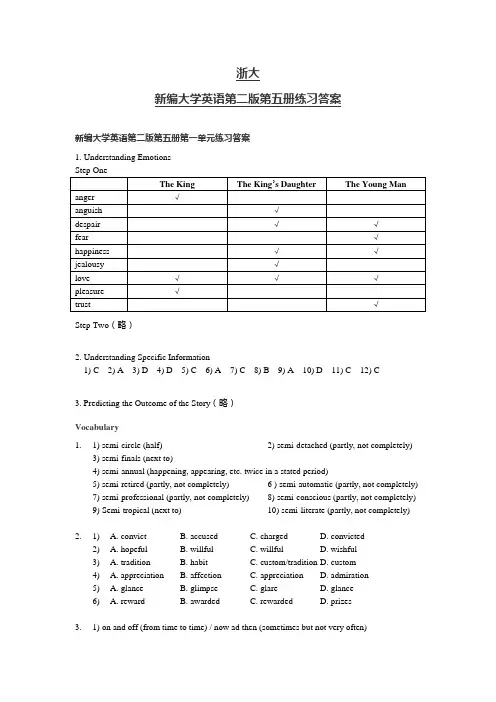
浙大新编大学英语第二版第五册练习答案新编大学英语第二版第五册第一单元练习答案1. Understanding EmotionsStep Two(略)2. Understanding Specific Information1) C 2) A 3) D 4) D 5) C 6) A 7) C 8) B 9) A 10) D 11) C 12) C3. Predicting the Outcome of the Story(略)Vocabulary1. 1) semi-circle (half) 2) semi-detached (partly, not completely)3) semi-finals (next to)4) semi-annual (happening, appearing, etc. twice in a stated period)5) semi-retired (partly, not completely) 6 ) semi-automatic (partly, not completely)7) semi-professional (partly, not completely) 8) semi-conscious (partly, not completely)9) Semi-tropical (next to) 10) semi-literate (partly, not completely)2. 1) A. convict B. accused C. charged D. convicted2) A. hopeful B. willful C. willful D. wishful3) A. tradition B. habit C. custom/tradition D. custom4) A. appreciation B. affection C. appreciation D. admiration5) A. glance B. glimpse C. glare D. glance6) A. reward B. awarded C. rewarded D. prizes3. 1) on and off (from time to time) / now ad then (sometimes but not very often)2) now and then (sometimes but not very often)3) here and there (in different places)4) ups and downs (good and bad periods following one another in turn)5) far and near (everywhere) 6) now ad then (sometimes but not very often)7) up and down (moving upwards and downwards)8) day and night (all the time) 9) day and night (all the time)10) on and off (from time to time)Part Three Further Development1. Enriching Your Word Power1) B 2) B 3) A 4) B 5) B 6) A 7) A 8) B 9) A 10) C2. Can You Solve This?Answer: The murderer is Mrs. Van Pelt.Reasons: 1) Mrs. Van Pelt smoked;2) Mrs. Van Pelt was wearing blue;3) A note found in Mrs. Van Pelt’s purse (She Knew about her husband’s affair with a lady called Elizabeth);4) At 11:10, five minutes after the murder, Mrs. Van Pelt came into the kitchen and heated milk.5) Mrs. Van Pelt’s name was Jane (Her husband was in love with someone else and wanted to divorce her).新编大学英语第二版第五册第二单元练习答案Post-Reading1.Understanding the Organization of the Text1) Introduction: (Para.1)A homeless man expresses thanks to a man holding the door for himSetting: a local restaurantCharacters: shoppers, families and studentsSituation: the coming and leaving of a homeless man2) Main Body (Para.2-11)There’s a lack of good manners in today’s world.Supporting evidence:A At the restaurant, no one thanked the people providing the service; (Para.2)B Women hardly show their gratefulness to people for their help while driving; (Para.4)C Fewer men hold open doors for those behind them; (Para.4)D Very often parents do not apologize for what their children do; (Para.7)E Children are not schooled in social graces; (Para.8)F Rude language is so commonplace that it is accepted behavior. (Para.10)3) Conclusion(Para.12-13)The importance of manners:In a crowded world, being polite to each other helps ease our daily stress.2.Understanding Specific Information1) B 2) B 3) C 4) A 5) C 6) C 7) B 8) B3.Expressing Your Own Ideas1)At the end of the article, the author raise s the question, “Are we really so pressured thatwe cannot stop to observe simple courtesy?” What do you think her answer would be?Do you agree with her? How do you explain the lack of courtesy?SAMPLE:The author’s answer must be “No”. I agree with her e ntirely. I think the lack of good manners is due to the following reasons:—People haven’t realized the importance of good manners;— There is a general lack of good manners in the society;— Children are not taught to observe courtesy at home and at school.2) The author says that “In a crowded world, manners are of vital importance.” Do you agree? If so, why?SAMPLE:I agree with what the author says in the article. With the increase of population, the world seems smaller. This inevitably causes more inconveniences, troubles, etc. If people do not observe courtesy in their everyday life, there will be quarrels, conflicts and even fights. The whole society will be in chaos. So I think that manners are really of vital importance in the world today.Vocabulary1. home-style (l. 1): like what is made at homeshopper (l. 2): someone who buys things in shopshomeless (l. 4): without a homediner (l. 12): someone who is eating dinner in a restaurantdiscomfort (l. 13): the state of being uneasy/uncomfortabletakeout (l. 14): dissatisfaction, disapprovaldisapproving (l. 21): showing that you think someone or something is bad or undesirableinconsiderate (l. 63): not caring about the feelings, needs or comfort of other peopledispleasure (l. 65): dissatisfaction; disapprovaloversensitive (l. 66): too easily influenced or offendeddisintegration (l.72): the state of becoming weaker or less united and being gradually destroyedbreakdown (l. 73): collapse (n.); failure to progress2. Fill in the blanksDirections: Fill in the blanks with the words and phrases given below. Change the form if necessary.commit gather up acknowledge help out inhabit be destined to indication chase derive from observe1)After he received the phone call, John gathered up his papers and left the room.【译文】接了一个电话之后,约翰收起他的论文离开了房间。
新编大学英语第二版2课后习题答案汇总
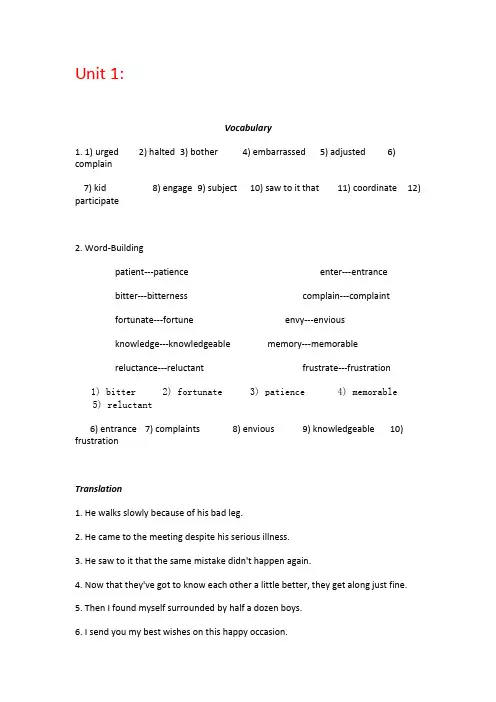
Vocabulary1. 1) urged 2) halted 3) bother 4) embarrassed 5) adjusted 6) complain7) kid 8) engage 9) subject 10) saw to it that 11) coordinate 12) participate2. Word-Buildingpatient---patience enter---entrancebitter---bitterness complain---complaintfortunate---fortune envy---enviousknowledge---knowledgeable memory---memorablereluctance---reluctant frustrate---frustration1) bitter 2) fortunate 3) patience 4) memorable5) reluctant6)entrance 7) complaints 8) envious 9) knowledgeable 10) frustrationTranslation1. He walks slowly because of his bad leg.2. He came to the meeting despite his serious illness.3. He saw to it that the same mistake didn't happen again.4. Now that they've got to know each other a little better, they get along just fine.5. Then I found myself surrounded by half a dozen boys.6. I send you my best wishes on this happy occasion.Vocabulary1. 1) mess 2) repeat 3) mislead 4) intends 5) tend 6) exaggerates7)frustrating 8) misinterpreted 9) acceptance 10) trust2.STEP ONE 1) F 2) C 3) A 4) K 5) I 6) E 7) H 8) J 9) G 10) B 11) D STEP TWO 1) conveyed/conveys 2) assistance 3) encounter 4) conflict 5) emphasis 6) reacted 7) recognize 8)manner 9)assumed/assume10) emerged/emerges 11) ignore3. 1) out 2) on 3) with 4) of 5) In 6) in 7) to 8) on 9) At 10) of Translation1)I went to the dentist yesterday to have a bad/decayed tooth pulledout.2)The development of things depends fundamentally on internal causes.3)All roads lead to Rome.4)I meant to give you that book today, but I forgot to bring it withme.5)I was on the verge of accepting his advice.6)Divorce is not a matter you can afford to take lightly.Unit 3:Vocabulary1.1) appreciateA. be thankful or grateful for 感激B. recognize and enjoy the good qualities or worth of 欣赏,赏识2) capacityA. the amount that something can hold or contain 容量,容积,容纳力B. ability or power 能力,才能,力量3) channelA. n.a particular television station 频道B. v.direct something towards a particular purpose 把……导向,引导,集中4) contributeA. join with others in giving 捐献,捐赠,贡献出B. help in causing a situation, event, or condition 有助于,促成5) flexibleA. that can bend or be bent easily 有弹性的,柔韧的B. that can change or be changed to be suitable for new needs 灵活的,可变通的6) guiltA. the fact of having broken a moral rule or official law 罪,罪行B. the feelings produced by knowledge or belief that one has done wrong 内疚,自责,悔恨7) potentialA. adj. likely to develop into a particular type of person or thing in the future 潜在的,可能的B.n. the inherent ability for growth and development 潜力,潜能8) rigidA. stiff, not easy to bend 硬的,不易弯曲的B. firm or fixed, difficult to change or unwilling to change 严格的,刻板的2.achieve— achievement depend—dependence cruel—cruelty genuine—genuineness aware—awareness capable—capability expect—expectation limit—limitation / limit unique—uniqueness respond—response disappoint—disappointment behave―behavior1) expectations 2) limitations 3) capability 4) achievement 5) response6) awareness 7) behavior 8) disappointment 9) cruelty 10) dependence 3. 1) entered into 2) channeled…into 3) holds/held back 4) unaware of 5) separates… from 6) referred to… as 7) lived up to 8) calls for 9) contributes to 10) sees/saw… asTranslation1. Lack of confidence contributed to his failure.2. She has shown great courage in the face of her serious illness.3. We came to the conclusion that she was telling the truth.4. His secretary failed to tell him about the meeting.5. Learning languages isn’t just a matter of memorizing words.6. Once she has made her decision, no one can hold her back.7. It’ll be difficult to live up to the standards set by our former captain.8. The scientist referred to the discovery as the most exciting new development in this field.Unit 5Vocabulary1. 1) explanation 2) enthusiasts 3) frustrating 4) popularity 5) unconscious 6) electrical 7) movements 8) recognizable 9) interpretation 10) countless2. Part A1) asleep 2) sleepless 3) sleep 4) sleepy 5) asleep 6) slept 7) sleeping, sleep 8) sleeperPart B1) submerged: go below the surface of the sea, river or lake (使)浸没,淹没2) subculture: the behavior, practices, etc. associated with a group within a society 亚文化3) submarine: a special type of ship which can travel under water 潜水艇4) subway: the passage under ground along which pedestrians can pass 地铁5) subzero: (of temperatures) below zero 零度以下的6) Subtropical: belonging to or relating to parts of the world that have very hot weather 副热带的,亚热带的7) subspecies: a subdivision of a species (物种的)亚种8) subnormal: below an average or expected standard, especially of intelligence 低于正常的3. 1) progressed 2) puzzled 3) process 4) reflected 5) predict 6) advances 7) symbol 8) ancient 9) error 10) conscious 11) analysis 12) innerTranslation1. You will see that what I am saying now will come true.2. The lecture was so boring that half (of) the students fell asleep.3. The problem of unemployment is tied up with the development of newtechnology.4. His appearance has changed so much that you may well not recognize him.5. The castle dates back to the 14th century.6. She has never done anything for them, whereas they have done everything they can for her.Unit 6Vocabulary1. 1) common 2) appropriate 3) forbidden 4) supplies 5) related6) evidence 7) requires 8) raise 9) spread 10) sufficiently2. 1) disgusting 2) habit 3) insects 4) reasonable 5)relatively6) animals 7) harvested 8) grow 9) nearly 10) other 11) altogether 12) consumed 13) avoided 14) popular 15) offers 16) served 17) would 18) enjoyed 19) considered 20) reject 3. 1) G 2) F 3) B 4) C 5) H 6) E 7) I 8) D 9) A 10) JTranslation1. We regard him as one of the best players in the game.2. The scientist picked up those little pieces of rock and carefully put them into a box.3. The population of China is almost five times as large as that of the United States.4. The reason why grass is green was once a mystery to the little boy.5. She was standing by the window, apparently quite calm and relaxed.6. Profits have declined as a result of the recent drop in sales.7. She put on dark glasses as a protection against the strong light.8. He could no longer be trusted after that incident.Unit 7Vocabulary1.1) saveA. help someone by making it unnecessary for them to do something unpleasantor inconvenientB. keep money so that you can use it later, especially when you gradually add moremoney over a period of time2) missionA. an important job that someone has been given to do especially when they aresent to another placeB. a group of important people who are sent by their government to anothercountry to discuss something or collect information3) doA. be suitable or acceptableB. cook4) exposeA. leave something no longer covered or protectedB. make known (something secret), reveal5) modestya. behavior in which one avoids talking about one’s abilities, qualities, orpossessionsb. the quality or state of being not large in size or amount, or not expensive6) observeA. watch carefully, especially to learn more about itB. obey (a law, rule or custom)7) flightA. a set of stairs between one floor and the nextB. a journey in a plane or space vehicle8) bowA. bend your body over something, especially in order to see it more clearlyB. a knot of cloth or string with a curved part on either side, used especially fordecoration 蝴蝶结9) pick upA. lift somethingB. learn something by watching or listening to other people10) takeA. need or requireB. understand or interpret in a particular way 理解或解释某事2. expose: reveal abrupt: sudden accomplish: achieve surpass: exceed feasible: workable assure: convince discourage: dissuade inevitable: unavoidable farewell: goodbye caution: warning compliment: praise honor: respect proposal: suggestion modify: change frustration: disappointment3. 1) with 2) arranged 3) majority 4) proportion/percentage 5)similar6) reaches 7) including 8) background 9) parents 10) if/whether 11) who 12) both 13) meetings 14) families 15) dating 16) before 17) decision 18) parents 19) marriage 20) rateTranslation1. If you sing the song several times, your children will (begin to) pick up the words.2. We tried to assure the nervous old man that flying/air travel was safe.3. An inadequate supply of vitamin A may lead to night blindness.4. I can use a computer, but when it comes to computer repairing, I know nothingabout it.5. Many a mother tries to act out her dreams through her daughter.Many a mother tries to have her dreams realized by her daughter.6. The bad weather discouraged people from attending the parade.7. I gave him some pills to ease his pain.8. The job involves traveling/working abroad three months each year.Unit 8Vocabulary Practice1. 1) at the top 2) cut back on 3) free from 4) all but 5) in light of6) do us/her any good 7) keep…up 8) rather than 9) adds… to 10) pointed out 11) plowed back into 12) has much to do with2. 1) stockA. a supply of something for use or sale 存货,库存物B. money lent to a government at a fixed rate of interest 公债,证卷2) orderA. (a person in authority) tell someone to do something 命令B. ask for (something) to be made, supplied or delivered, especially in a restaurantor shop 订制;订购;点菜等3) consumeA. fill the thoughts or feelings continuously, especially in a damaging way 为某种思想/感情不断受折磨B. use (something) up 用完4) breedA. keep (animals or plants) for the purpose of producing young animals or plants繁殖, 培植B. a particular type of animal or plant 品种5) rawA. inexperienced 不熟练的,无经验的B. in the natural state, not yet treated for use 未经加工的6) stressA. extra force used in speaking a particular word or syllable 重读,重音B. great worry caused by a difficult situation 痛苦,压力7) philosophyA. the study of the nature and meaning of existence, truth, good and evil, etc. 哲学B. set of beliefs or an outlook on life that is a guiding principle for behavior 生活的信念或原则8) recallA. bring (something/somebody) back into the mind 回忆B. order somebody to return (from a place) 召回9) netA. remaining when nothing more is to be taken away 净的B. something that is made of threads woven across each other with regularspaces between them 网10) putA. write 写B. convey one’s ideas 传递思想11) confirmA. check that a possible arrangement is now definite 确认B. show that something is definitely true 证实12) spinA. (make something) turn round and round extremely quickly (使……)旋转B. make cotton, wool etc. into thread by twisting it 纺纱,纺线3. Story-TellingThe teacher may divide the classinto groups and tell them that foreach word or phrase a group gives, $1will be deposited in its name in thebank, and that for each word orphrase that is properly used in thestory, $5 will be added to the bank. Atthe end of the activity, the wholeclass will see which group has earnedthe most.Words or phrases related to money:From the text: sum, financial, wealthy, fund, penniless, dollar, save, purchase, spend, stock market, fortune, poor, rich, income, paycheck, afford,consumer,bankrupt, bankruptcy, debtOutside the text: salary, pocket money, profit, investment, loan, installment, expense, bank, property, bill, pay, millionaire, to spend money like water, silver, etc.SampleHu Ning hoped to become rich. In fact, he dreamed of being a millionaire with a large fortune that he could use to pay back all his debts, to purchase expensive gifts for his friends and relatives, and to buy a property for his children. Unfortunately, Hu Ning was penniless, and had the bad habit of spending money like water. He was incapable of saving money. He never even had enough pocket money. With his small salary, he lived from paycheck to paycheck. To realize his dreams, he needed a really big income. He felt the best way to become wealthy was to study the stock market and learn how to invest in stocks. But first he had to figure out how to convince his family that he could make a large sum of money by investing in stocks. Then he had to borrow money from his friends or relatives. If he could get money from any of them, do you believe he could become a millionaire?!Translation1. I feel I should point out how dangerous it is.2. Their opinion will not affect my decision.3. When it comes to modern art, few people know more than Tom does.4. When asked, she confirmed that she was going to retire.5. The cough medicine tastes nice, but it doesn’t do me much good.6. If we can’t sell more goods, we’ll have to cut back on the production.7. The film is all but three hours long.8. I assure you that it is true, lest anyone (should) think my story strange.。
大学期间各科目的课后习题答案与模拟卷及往年原题
《新视野大学英语读写教程(第二版)第三册》课后答案新视野大学英语读写教程(第二版)第一册》课后答案《马·克思主·义大体原理概论》新版完整答案《毛·泽东思想和中国特色社会主·义理论体系概论》习题答案(2020年修订版的)21世纪大学实用英语综合教程(第一册)课后答案及课文翻译西方经济学(高鸿业版)教材详细答案《新视野大学英语读写教程(第二版)第二册》课后答案思想道德修养与法律基础课后习题答案《中国近代史纲要》完整课后答案(高教版)《全新版大学英语综合教程》(第三册)练习答案及课文译文《全新版大学英语综合教程》(第一册)练习答案及课文译文《会计学原理》同步练习题答案《微观经济学》课后答案(高鸿业版)《统计学》课后答案(第二版,贾俊平版)《西方经济学》习题答案(第三版,高鸿业)可直接打印毛邓三全部课后思考题答案(高教版)/毛邓三课后答案新视野大学英语听说教程1听力原文及答案下载西方宏观经济高鸿业第四版课后答案《管理学》经典笔记(周三多,第二版)《中国近代史纲要》课后习题答案《理论力学》课后习题答案《线性代数》(同济第四版)课后习题答案(完整版)高等数学(同济第五版)课后答案(PDF格式,共527页)中国近现代史纲要课后题答案曼昆《经济学原理》课后习题解答21世纪大学英语读写教程(第三册)参考答案谢希仁《计算机网络教程》(第五版)习题参考答案(共48页)《概率论与数理统计》习题答案《模拟电子技术基础》详细习题答案(童诗白,华成英版,高教版)《机械设计》课后习题答案(高教版,第八版,西北工业大学)《大学物理》完整习题答案《管理学》课后答案(周三多)机械设计基础(第五版)习题答案[杨可桢等主编]程守洙、江之永主编《普通物理学》(第五版)详细解答及辅导新视野大学英语课本详解(四册全)21世纪大学英语读写教程(第四册)课后答案新视野大学英语读写教程3册的课后习题答案新视野大学英语第四册答案(第二版)《中国近现代史》选择题全集(共含250道题目和答案)《电工学》课后习题答案(第六版,上册,秦曾煌主编)完整的英文原版曼昆宏观、微观经济学答案《数字电子技术基础》习题答案(阎石,第五版)《电路》习题答案上(邱关源,第五版)《电工学》习题答案(第六版,秦曾煌)21世纪大学英语读写教程(第三册)课文翻译《生物化学》复习资料大全(3套试卷及答案+各章习题集)《模拟电子技术基础》课后习题答案(共10章)《概率论与数理统计及其应用》课后答案(浙江大学盛骤谢式千编著)《理论力学》课后习题答案(赫桐生,高教版)《全新版大学英语综合教程》(第四册)练习答案及课文译文《化工原理答案》课后习题答案(高教出版社,王志魁主编,第三版)《国际贸易》课后习题答案(海闻P.林德特王新奎)大学英语综合教程1-4册练习答案《流体力学》习题答案《传热学》课后习题答案(第四版)高等数学习题答案及提示《高分子化学》课后习题答案(第四版,潘祖仁主编)马·克思主·义大体原理概论答案《计算机网络》课后习题解答(谢希仁,第五版)《概率论与数理统计》优秀学习资料《离散数学》习题答案(高等教育出版社)《模拟电子技术基础简明教程》课后习题答案(杨素行第三版)《信号与线性系统分析》习题答案及辅导参考(吴大正版)《教育心理学》课后习题答案(皮连生版)《理论力学》习题答案(动力学和静力学)选修课《中国现当代文学》资料包机械设计课程设计——二级斜齿圆柱齿轮减速器(WORD+原图)《成本会计》配套习题集参考答案《概率论与数理统计》8套习题及习题答案(自学推荐)《现代西方经济学(微观经济学)》笔记与课后习题详解(第3版,宋承先)《计算机操作系统》习题答案(汤子瀛版,完整版)《毛·泽东思想和中国特色社会主·义理论体系概论》有史以来最全面的温习资料!!!《线性代数》9套习题+9套相应答案(自学,复习推荐)《管理理论与实务》课后题答案(手写版,中央财经大学,赵丽芬)统计学原理作业及参考答案机械设计课程设计——带式运输机的传动装置的设计《物理学》习题分析与解答(马文蔚主编,清·华大学,第五版)《新编大学英语》课后答案(第三册)《通信原理》课后习题答案及每章总结(樊昌信,国防工业出版社,第五版)《c语言程序与设计》习题答案(谭浩强,第三版)《微生物学》课后习题答案(周德庆版)新视野第二版全四册听说教程答案《宏观经济学》课后答案(曼昆,中文版)《电力电子技术》习题答案(第四版,王兆安,王俊主编)《土力学》习题解答/课后答案《公司法》课后练习及参考答案《全新版大学英语综合教程》(第二册)练习答案及课文译文新视野大学英语视听说第三册答案《工程力学》课后习题答案(梅凤翔主编)《理论力学》详细习题答案(第六版,哈工大出版社)《成本会计》习题及答案(自学推荐,23页)《自动控制原理》课后题答案(胡寿松,第四版)《复变函数》习题答案(第四版)《信号与系统》习题答案(第四版,吴大正)《有机化学》课后答案(第二版,高教版,徐寿昌主编)《电工学——电子技术》习题答案(下册)《财务管理学》章后练习参考答案(人大出版,第四版)现代汉语题库(语法部分)及答案《概率论与数理统计》习题详解(浙大二、三版通用)《有机化学》习题答案(汪小兰主编)《微机原理及应用》习题答案《管理运筹学》第二版习题答案(韩伯棠教授)《古代汉语》习题集(附习题答案)福建人民出版社《金融市场学》课后习题答案(张亦春,郑振龙,第二版)《公共关系学》习题及参考答案(复习必备)现代汉语通论(邵敬敏版)词汇语法课后练习答案《国际经济学》教师手册及课后习题答案(克鲁格曼,第六版)《教育技术》课后习题答案参考(北师大)《金融市场学》课后答案(郑振龙版)《组织行为学》习题集答案(参考下,还是蛮好的)《分析化学》课后习题答案(第五版,高教版)大学英语精读第3册答案(外教社)《国际经济学》习题答案(萨尔瓦多,英文版)《复变函数与积分变换》习题答案《信息论与编码》辅导PPT及部分习题答案(曹雪虹,张宗橙,北京邮电大学出版社)《宏观经济学》习题答案(第七版,多恩布什)《物理化学》习题解答(天津大学, 第四版,106张)新视野大学英语视听说教程第一册《机械制造技术》习题集与答案解析新视野大学英语听说教程2册听力原文及答案下载管理学试题(附答案)《材料力学》详细辅导及课后答案(PDF格式,共642页)六级词汇注解《大学基础物理学》课后答案(共16个单元)《管理学——原理与方式》课后习题答案新视野2版第三册(大2上学期用)曼昆《经济学原理》中文第四版.课后习题答案-清晰图片版《数据库系统概论》课后习题(第四版)大学数学基础教程课后答案(微积分)《投资学》课后习题答案(博迪,第四版)流体力学课后答案(高教版,张也影,第二版)《语言学概论》习题答案(自考,新版教材)《统计学》各章练习题答案《数字电子技术基础》课后习题答案(完整答案版)《积分变换》习题答案(配套东南大学张元林编的)《中级财务会计》习题答案(第二版,刘永泽)《计算机网络》课后习题答案(第5版和第4版)《单片机原理及应用》课后习题答案(张毅刚主编,高教版)《金融工程》课后题答案(郑振龙版)《液压传动》第2版思考题和习题解答(共36页)《动物学》习题集与答案(资料相当丰富)《高频电子线路》习题参考答案(第四版)《国际经济法》课后参考答案大学英语四级十年真题+听力《信号与系统》习题详解(奥本海姆版)《电路分析》课后答案及学习指导(第二版,胡翔骏,高教版)《C语言设计》(谭浩强,第三版)227页新视野大学英语课后习题答案1-4册全集《数字电路与逻辑设计》课后习题答案,讲解详细《电路》第五版课后答案《材料力学》详细习题答案及辅导(第四版,刘鸿文)《传播学教程》课后答案(郭庆光主编,完整版)《物理化学》习题答案与课件集合(南大)《金融市场学》电子书(张亦春,郑振龙,第二版)毛邓三95%考点高等教育出版社《毛·泽东思想和中国特色社会主·义道路》(09版,原毛邓三)课后题答案《线性代数》课后习题答案(陈维新,科学出版社)自动控制原理习题集(自学辅导推荐)《现代通信原理》习题答案(曹志刚版)高等数学上下《习题PPT》《数据结构习题集》答案(C版,清·华大学,严蔚敏)《大学物理学》习题解答《物理化学》习题答案(南大,第五版)《机械原理》复习精要与习题精解(第7版,西北大学)《宏观经济学》答案(曼昆,第五版,英文版)pdf格式《化工热力学》习题与习题答案(含各种版本)《材料力学》习题答案教育统计与测量管理心理学(自考必备资料,牛逼打印版)离散数学习题解答(第四版)清·华大学出版社货币银行学《技术经济学概论》(第二版)习题答案《毛·泽东思想和社会主·义建设理论题概论》精炼考试题目,耐心整理《数字信号处理》课后答案及详细辅导(丁美玉,第二版)《语言学概论练习题》答案《会计电算化》教材习题答案(09年)《数据库系统概论》习题答案(第四版)《微观经济学》课后答案(平狄克版)《控制工程基础》课后习题解答(清·华版)《高分子化学》习题答案(第四版)《电机与拖动基础》课后习题答案(第四版,机械工业出版社,顾绳谷主编)《机械工程测试技术基础》(第三版,熊诗波等主编)课后答案《宏观经济学》课后答案(布兰查德版)《机械原理》习题答案和超多例题(西北工业大学,第六版)《大学物理基础教程》课后习题答案(第二版,等教育出版社)简明乐谱基础知识《语言学教程》课后答案《公司理财》课后答案(英文版,第六版)《信息论与编码》学习辅导及习题详解(傅祖芸版)《遗传学》课后习题答案(朱军主编,完整版)现代人心理实战700题处世韬略《自动控制原理》习题答案《普通动物学》完整课后答案(刘凌云,郑光美版)《微机原理》作业答案(李继灿版)尼尔·波兹曼《娱乐至死》《电力电子技术》习题答案(第4版,西安交通大学)大学英语四级(CET-4)历年真题大全[89-07年39套](精品级)753页word 《通信原理》习题答案《普通化学(第五版)》习题详解(配套浙大编的)经济法课后复习及思考答案《结构化学基础》习题答案(周公度,北大版)财务管理学课后答案荆新王化成《C++程序设计》课后习题答案(第2版,吴乃陵,高教版)药用植物的两份习题(自己感觉比较有用)《数学物理方法》习题解答案详细版(梁昆淼,第二版)《机械制图》习题册答案(近机类、非机类,清·华大学出版社)《控制工程基础》习题答案(第二版,燕山大学)《画法几何》资料包(含习题答案,自学辅导课件)《畜禽解剖学与组织胚胎学》习题答案参考《统计学》课后习题答案(周恒彤编)《西方经济学简明教程》课后习题全解(尹伯成,上海人民出版社)《汽车理论》课后答案详细解答(余志生,机械工业出版社)《数学物理方法》(第三版)习题答案新视野听力原文及课后答案新编大学英语4(外研版)课后练习答案《材料力学》习题答案(单辉祖,北京航空航天大学)大学英语精读第3册课文及课后答案《自动控制原理》课后习题答案———胡寿松,第五版《数据库系统原理与设计》课后答案(第四版,王珊,萨师煊)《数字电子技术基础》详细习题答案(阎石第四版)财经应用文笔记《管理学》课后习题答案(罗宾斯,人大版,第7版)《概率论与数理统计》习题答案(复旦大学出版社)《数字信号处理——基于运算机的方式》习题答案(第二版)《传热学》课后答案(杨世铭,陶文铨主编,高教版)C语言资料大全(有课后答案,自学资料,C程序等)毛邓三重点归纳《电力拖动自动控制系统》习题答案逄锦聚《政治经济学》(第3版)笔记和课后习题详解《概率论与数理统计》课后习题解答(东南大学出版社)《有机化学》课后习题答案(胡宏纹,第三版)《常微分方程》习题解答(王高雄版)▆▆▆▆▆▆▆▆▆▆▆▆▆▆▆▆▆▆▆▆▆▆▆▆▆▆▆▆▆▆【因为太多了,没方法再粘贴到那个地址了,更多答案,直接进入下面那个搜索就好】源地址:||。
外研版高中英语选择性必修第二册课后习题 Unit 5 A delicate world 单元测评卷
第五单元测评第一部分听力(共两节,满分30分)第一节(共5小题;每小题1.5分,满分7.5分)听下面5段对话。
每段对话后有一个小题,从题中所给的 A、B、C 三个选项中选出最佳选项。
听完每段对话后,你都有 10 秒钟的时间来回答有关小题和阅读下一小题。
每段对话仅读一遍。
1.What does the man want to do?A.Watch films.B.Visit his brother.C.Have dinner with the woman.2.Where does the conversation take place?A.At a shop.B.At a restaurant.C.At a concert.3.How many pieces will the man eat?A.Six.B.Four.C.Two.4.How has the bar changed?A.It is cleaner.B.It has new owners.C.It doesn’t serve sunflower seeds.5.What’s the probable relationship between the speakers?A.Husband and wife.B.Salesman and customer.C.Interviewer and interviewee.第二节(共15小题;每小题1.5分,满分22.5分)听下面5段对话或独白。
每段对话或独白后有几个小题,从题中所给的A、B、C三个选项中选出最佳选项。
听每段对话或独白前,你将有时间阅读各个小题,每小题5秒钟;听完后,各小题将给出5秒钟的作答时间。
每段对话或独白读两遍。
听下面一段对话,回答第6、7题。
6.What is the man mainly talking about?A.Silences.B.Japanese culture.C.Interesting facts.7.How does the woman feel in the end?A.Annoyed.B.Satisfied.C.Curious.听下面一段对话,回答第8、9题。
大学教材课后习题答案大全
大学教材课后习题答案大全▆▆▆▆▆▆▆▆▆▆▆▆▆▆▆▆▆▆▆▆▆▆▆▆▆▆▆▆《新视野大学英语读写教程(第二版)第三册》课后答案http:新视野大学英语读写教程(第二版)第一册》课后答案http:《马·克思主·义基本原理概论》新版完整答案http:《毛·泽东思想和中国特色社会主·义理论体系概论》习题答案(2008年修订版的)http:21世纪大学实用英语综合教程(第一册)课后答案及课文翻译http:西方经济学(高鸿业版)教材详细答案http:《新视野大学英语读写教程(第二版)第二册》课后答案http:思想道德修养与法律基础课后习题答案http:《中国近代史纲要》完整课后答案(高教版)http:《全新版大学英语综合教程》(第三册)练习答案及课文译文http:《全新版大学英语综合教程》(第一册)练习答案及课文译文http:《会计学原理》同步练习题答案http:《微观经济学》课后答案(高鸿业版)http:《统计学》课后答案(第二版,贾俊平版)http:《西方经济学》习题答案(第三版,高鸿业)可直接打印http:毛邓三全部课后思考题答案(高教版)/毛邓三课后答案http:新视野大学英语听说教程1听力原文及答案下载http:西方宏观经济高鸿业第四版课后答案http:《管理学》经典笔记(周三多,第二版)http:《中国近代史纲要》课后习题答案http:《理论力学》课后习题答案http:《线性代数》(同济第四版)课后习题答案(完整版)http:高等数学(同济第五版)课后答案(PDF格式,共527页)http:中国近现代史纲要课后题答案http:曼昆《经济学原理》课后习题解答http:21世纪大学英语读写教程(第三册)参考答案http:谢希仁《计算机网络教程》(第五版)习题参考答案(共48页)http:《概率论与数理统计》习题答案http:《模拟电子技术基础》详细习题答案(童诗白,华成英版,高教版)http:《机械设计》课后习题答案(高教版,第八版,西北工业大学)http:《大学物理》完整习题答案http:《管理学》课后答案(周三多)http:机械设计基础(第五版)习题答案[杨可桢等主编]http:程守洙、江之永主编《普通物理学》(第五版)详细解答及辅导http:新视野大学英语课本详解(四册全)http:21世纪大学英语读写教程(第四册)课后答案http:新视野大学英语读写教程3册的课后习题答案http:新视野大学英语第四册答案(第二版)http:《中国近现代史》选择题全集(共含250道题目和答案)http:《电工学》课后习题答案(第六版,上册,秦曾煌主编)http:完整的英文原版曼昆宏观、微观经济学答案http:《数字电子技术基础》习题答案(阎石,第五版)http:《电路》习题答案上(邱关源,第五版)http:《电工学》习题答案(第六版,秦曾煌)http:21世纪大学英语读写教程(第三册)课文翻译http:《生物化学》复习资料大全(3套试卷及答案+各章习题集)http:《模拟电子技术基础》课后习题答案(共10章)http:《概率论与数理统计及其应用》课后答案(浙江大学盛骤谢式千编著)http:《理论力学》课后习题答案(赫桐生,高教版)http:《全新版大学英语综合教程》(第四册)练习答案及课文译文http:《化工原理答案》课后习题答案(高教出版社,王志魁主编,第三版)http:《国际贸易》课后习题答案(海闻P.林德特王新奎)http:大学英语综合教程1-4册练习答案http:《流体力学》习题答案http:《传热学》课后习题答案(第四版)http:高等数学习题答案及提示http:《高分子化学》课后习题答案(第四版,潘祖仁主编)http:马·克思主·义基本原理概论答案http:《计算机网络》课后习题解答(谢希仁,第五版)http:《概率论与数理统计》优秀学习资料http:《离散数学》习题答案(高等教育出版社)http:《模拟电子技术基础简明教程》课后习题答案(杨素行第三版)http:《信号与线性系统分析》习题答案及辅导参考(吴大正版)http:《教育心理学》课后习题答案(皮连生版)http:《理论力学》习题答案(动力学和静力学)http:选修课《中国现当代文学》资料包http:机械设计课程设计——二级斜齿圆柱齿轮减速器(WORD+原图)http:《成本会计》配套习题集参考答案http:《概率论与数理统计》8套习题及习题答案(自学推荐)http:《现代西方经济学(微观经济学)》笔记与课后习题详解(第3版,宋承先)http:《计算机操作系统》习题答案(汤子瀛版,完整版)http:《毛·泽东思想和中国特色社会主·义理论体系概论》有史以来最全面的复习资料!!!http:《线性代数》9套习题+9套相应答案(自学,复习推荐)http:《管理理论与实务》课后题答案(手写版,中央财经大学,赵丽芬)http:统计学原理作业及参考答案http:机械设计课程设计——带式运输机的传动装置的设计http:《物理学》习题分析与解答(马文蔚主编,清·华大学,第五版)http:《新编大学英语》课后答案(第三册)http:《通信原理》课后习题答案及每章总结(樊昌信,国防工业出版社,第五版)http:《c语言程序与设计》习题答案(谭浩强,第三版)http:《微生物学》课后习题答案(周德庆版)http:新视野第二版全四册听说教程答案http:《宏观经济学》课后答案(曼昆,中文版)http:《电力电子技术》习题答案(第四版,王兆安,王俊主编)http:《土力学》习题解答/课后答案http:《公司法》课后练习及参考答案http:《全新版大学英语综合教程》(第二册)练习答案及课文译文http:新视野大学英语视听说第三册答案http:《工程力学》课后习题答案(梅凤翔主编)http:《理论力学》详细习题答案(第六版,哈工大出版社)http:《成本会计》习题及答案(自学推荐,23页)http:《自动控制原理》课后题答案(胡寿松,第四版)http:《复变函数》习题答案(第四版)http:《信号与系统》习题答案(第四版,吴大正)http:《有机化学》课后答案(第二版,高教版,徐寿昌主编)http:《电工学——电子技术》习题答案(下册)http:《财务管理学》章后练习参考答案(人大出版,第四版)http:现代汉语题库(语法部分)及答案http:《概率论与数理统计》习题详解(浙大二、"三版通用)http:《有机化学》习题答案(汪小兰主编)http:《微机原理及应用》习题答案http:《管理运筹学》第二版习题答案(韩伯棠教授)http:《古代汉语》习题集(附习题答案)福建人民出版社http:《金融市场学》课后习题答案(张亦春,郑振龙,第二版)http:《公共关系学》习题及参考答案(复习必备)http:现代汉语通论(邵敬敏版)词汇语法课后练习答案http:《国际经济学》教师手册及课后习题答案(克鲁格曼,第六版)http:《教育技术》课后习题答案参考(北师大)http:《金融市场学》课后答案(郑振龙版)http:《组织行为学》习题集答案(参考下,还是蛮好的)http:《分析化学》课后习题答案(第五版,高教版)http:大学英语精读第3册答案(外教社)http:《国际经济学》习题答案(萨尔瓦多,英文版)http:《复变函数与积分变换》习题答案http:《信息论与编码》辅导PPT及部分习题答案(曹雪虹,张宗橙,北京邮电大学出版社)http:《宏观经济学》习题答案(第七版,多恩布什)http:《物理化学》习题解答(天津大学,第四版,106张)http:新视野大学英语视听说教程第一册http:《机械制造技术》习题集与答案解析http:新视野大学英语听说教程2册听力原文及答案下载http:管理学试题(附答案)http:《材料力学》详细辅导及课后答案(PDF格式,共642页)http:六级词汇注解http:《大学基础物理学》课后答案(共16个单元)http:《管理学——原理与方法》课后习题答案http:新视野2版第三册(大2上学期用)http:曼昆《经济学原理》中文第四版.课后习题答案-清晰图片版http:《数据库系统概论》课后习题(第四版)http:大学数学基础教程课后答案(微积分)http:《投资学》课后习题答案(博迪,第四版)http:流体力学课后答案(高教版,张也影,第二版)http:《语言学概论》习题答案(自考,新版教材)http:《统计学》各章练习题答案http:《数字电子技术基础》课后习题答案(完整答案版)http:《积分变换》习题答案(配套东南大学张元林编的)http:《中级财务会计》习题答案(第二版,刘永泽)http:《计算机网络》课后习题答案(第5版和第4版)http:《单片机原理及应用》课后习题答案(张毅刚主编,高教版)http:《金融工程》课后题答案(郑振龙版)http:《液压传动》第2版思考题和习题解答(共36页)http:《动物学》习题集与答案(资料相当丰富)http:《高频电子线路》习题参考答案(第四版)http:《国际经济法》课后参考答案http:大学英语四级十年真题+听力http:《信号与系统》习题详解(奥本海姆版)http:《电路分析》课后答案及学习指导(第二版,胡翔骏,高教版)http:《C语言设计》(谭浩强,第三版)227页http:新视野大学英语课后习题答案1-4册全集http:《数字电路与逻辑设计》课后习题答案,讲解详细http:《电路》第五版课后答案http:《材料力学》详细习题答案及辅导(第四版,刘鸿文)http:《传播学教程》课后答案(郭庆光主编,完整版)http:《物理化学》习题答案与课件集合(南大)http:《金融市场学》电子书(张亦春,郑振龙,第二版)http:毛邓三95%考点http:高等教育出版社《毛·泽东思想和中国特色社会主·义道路》(09版,原毛邓三)课后题答案http:《线性代数》课后习题答案(陈维新,科学出版社)http:自动控制原理习题集(自学辅导推荐)http:《现代通信原理》习题答案(曹志刚版)http:高等数学上下《习题PPT》http:《数据结构习题集》答案(C版,清·华大学,严蔚敏)http:《大学物理学》习题解答http:《物理化学》习题答案(南大,第五版)http:《机械原理》复习精要与习题精解(第7版,西北大学)http:《宏观经济学》答案(曼昆,第五版,英文版)pdf格式http:《化工热力学》习题与习题答案(含各种版本)http:《材料力学》习题答案http:教育统计与测量管理心理学(自考必备资料,牛逼打印版)http:离散数学习题解答(第四版)清·华大学出版社http:货币银行学http:《技术经济学概论》(第二版)习题答案http:《毛·泽东思想和社会主·义建设理论题概论》精炼考试题目,耐心整理http:《数字信号处理》课后答案及详细辅导(丁美玉,第二版)http:《语言学概论练习题》答案http:《会计电算化》教材习题答案(09年)http:《数据库系统概论》习题答案(第四版)http:《微观经济学》课后答案(平狄克版)http:《控制工程基础》课后习题解答(清·华版)http:《高分子化学》习题答案(第四版)http:《电机与拖动基础》课后习题答案(第四版,机械工业出版社,顾绳谷主编)http:《机械工程测试技术基础》(第三版,熊诗波等主编)课后答案http:《宏观经济学》课后答案(布兰查德版)http:《机械原理》习题答案和超多例题(西北工业大学,第六版)http:《大学物理基础教程》课后习题答案(第二版,等教育出版社)http:简明乐谱基础知识http:《语言学教程》课后答案http:《公司理财》课后答案(英文版,第六版)http:《信息论与编码》学习辅导及习题详解(傅祖芸版)http:《遗传学》课后习题答案(朱军主编,完整版)http:现代人心理实战700题处世韬略http:《自动控制原理》习题答案http:《普通动物学》完整课后答案(刘凌云,郑光美版)http:《微机原理》作业答案(李继灿版)http:尼尔·波兹曼《娱乐至死》http:《电力电子技术》习题答案(第4版,西安交通大学)http:大学英语四级(CET-4)历年真题大全[89-07年39套](精品级)753页wordhttp:《通信原理》习题答案http:《普通化学(第五版)》习题详解(配套浙大编的)http:经济法课后复习及思考答案http:《结构化学基础》习题答案(周公度,北大版)http:财务管理学课后答案荆新王化成http:《C++程序设计》课后习题答案(第2版,吴乃陵,高教版)http:药用植物的两份习题(自己感觉比较有用)http:《数学物理方法》习题解答案详细版(梁昆淼,第二版)http:《机械制图》习题册答案(近机类、非机类,清·华大学出版社)http:《控制工程基础》习题答案(第二版,燕山大学)http:《画法几何》资料包(含习题答案,自学辅导课件)http:《畜禽解剖学与组织胚胎学》习题答案参考http:《统计学》课后习题答案(周恒彤编)http:《西方经济学简明教程》课后习题全解(尹伯成,上海人民出版社)http:《汽车理论》课后答案详细解答(余志生,机械工业出版社)http:《数学物理方法》(第三版)习题答案http:新视野听力原文及课后答案http:新编大学英语4(外研版)课后练习答案http:《材料力学》习题答案(单辉祖,北京航空航天大学)http:大学英语精读第3册课文及课后答案http:《自动控制原理》课后习题答案———胡寿松,第五版http:《数据库系统原理与设计》课后答案(第四版,王珊,萨师煊)http:《数字电子技术基础》详细习题答案(阎石第四版)http:财经应用文笔记http:《管理学》课后习题答案(罗宾斯,人大版,第7版)http:《概率论与数理统计》习题答案(复旦大学出版社)http:《数字信号处理——基于计算机的方法》习题答案(第二版)http:《传热学》课后答案(杨世铭,陶文铨主编,高教版)http:C语言资料大全(有课后答案,自学资料,C程序等)http:毛邓三重点归纳http:《电力拖动自动控制系统》习题答案http:逄锦聚《政治经济学》(第3版)笔记和课后习题详解http:《概率论与数理统计》课后习题解答(东南大学出版社)http:《有机化学》课后习题答案(胡宏纹,第三版)http:《常微分方程》习题解答(王高雄版)http:▆▆▆▆▆▆▆▆▆▆▆▆▆▆▆▆▆▆▆▆▆▆▆▆▆▆▆▆▆▆【因为太多了,没办法再粘贴到这里了,更多答案,直接进入下面这个搜索就好】http:。
外研社浙大新编大学英语第二版第五册上机自学测试题第三单元答案
翻译:总统的辞职对政府的政策造成了显著的影响。
2) Can you adapt your way of thinking to the new life-style?
翻译:你能让你的思维方式适应新的生活方式吗?
3) Andrew and Rebecca are in conflict over who should be responsible for the accident.
Part One Preparation
1. Talking aboune
Companies
Products
Motorola
mobile phone
Wahaha Group
mineral water, Future Cola, fruit milk
P & G
face cream, soap, shampoo, tooth paste, detergent
- 1、下载文档前请自行甄别文档内容的完整性,平台不提供额外的编辑、内容补充、找答案等附加服务。
- 2、"仅部分预览"的文档,不可在线预览部分如存在完整性等问题,可反馈申请退款(可完整预览的文档不适用该条件!)。
- 3、如文档侵犯您的权益,请联系客服反馈,我们会尽快为您处理(人工客服工作时间:9:00-18:30)。
外研社浙大新编大学英语第二版第五册上机自学测试题第九单
元答案
Post—Reading
Reading Comprehension
1. Understanding the Organization of the Text
Directions: Work in pairs to complete the following outline of the text.
1) Introduction: It’s important to study public speaking. (Para.1-2)
Reasons:
A. Everyday many people are doing public speaking for different purposes.
B. Students today will one day be asked to do public speaking, too.
2) Personal Benefits of Studying Public Speaking (Para.4-7):
A. Mastering public speaking can help you acquire skills important to your success in college.
Supporting evidence: A recent Carnegie Foundation report.
B. Public speaking can help you become more knowledgeable.
Supporting evidence:
a. A saying: we learn most from what we speak.
b. Delivering the lecture out loud promotes better understanding and retention of the course material
c. The process of developing and delivering an idea clarifies it and helps make it uniquely your own
3) Professional Benefits of Studying Public Speaking (Para.8-10):
Effective speaking skills enhance your chances of first
securing employment and then advancing in your career.
Supporting evidence:
A. The survey by John Hafer and C.C. Hoth
Sample: 37 companies.
Result: Oral communication skills ranked first out of 26 characteristics.
B. The survey by three speech and business professor.
Sample: 428 responses from personnel managers in business organizations.
Result: Oral communication skills ranked first.
C. The survey by Roger Mosvick and Robert Nelson.
Sample: 500 executives.
Result: Speaking skills rated second only to job knowledge as important factors in a businessperson’s success and that effective communication helped improve company productivity and understanding among employees.
4) Public Benefits of Studying Public Speaking (Para.11-14):
Public speaking can help you play your role as a member of society.
Supporting evidence:
A. Speech is civilization itself.
B. A democratic society is shaped, in part, by the eloquence of its leaders.
C. A democratic society is also shaped by the quiet eloquence of everyday citizens.
2. Understanding Specific Information
1) No 2) Maybe 3) Yes 4) Yes 5) Yes 6) Yes 7) Maybe 8) Maybe
3. Case Study(略)
vocabulary
1. 1) contradictory 2) legislation 3) solicit/obtain 4) Democratic 5) obtain
6) involvement 7) employment 8) eloquence 9) clarity 10) inaugurated
2. 1) If 2) being 3) minimum 4) interesting
5) what 6) recognizing 7) nervous 8) worries
9) through 10) make 11) sound 12) what
13) healthy 14) reasonably 15) teachable 16) share
Part Three Further Development
1. Enriching Your Word Power
1) B 2) B 3) C 4) C 5) B 6) C
7) B
8) A 9) C 10) C 11) A 12) A
13) A 14) B 15) A 16) B 17) C 18) C。
